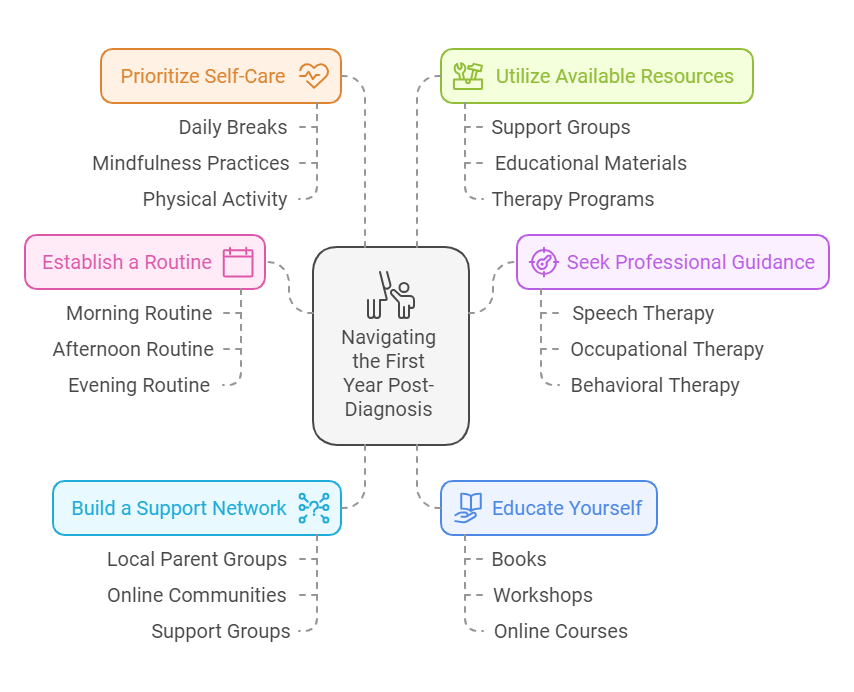Becoming a parent is a life-changing experience—add an autism diagnosis, and the journey becomes even more unique. Did you know that approximately 1 in 36 children are diagnosed with an autism spectrum disorder (ASD)? This growing statistic underscores the importance of support and resources for new parents navigating this path.
 Understanding how to navigate the first year as a new parent of an autistic child is crucial. This period lays the foundation for your child’s development and your family’s well-being. In this guide, you will learn:
Understanding how to navigate the first year as a new parent of an autistic child is crucial. This period lays the foundation for your child’s development and your family’s well-being. In this guide, you will learn:
- How to establish a supportive routine
- Ways to seek professional guidance
- Building a strong support network
- Educating yourself about autism
- Prioritizing self-care
- Utilizing available resources
Let’s explore the essential steps that will help you confidently navigate this transformative year.
Understanding Autism Diagnosis in the First Year
What is an Autism Diagnosis?
An autism diagnosis refers to the identification of Autism Spectrum Disorder (ASD) in a child, typically based on behavioral assessments and developmental evaluations. Early diagnosis is vital as it allows parents to access resources and interventions that can support their child’s growth and development.
Why Early Diagnosis Matters
Early diagnosis can significantly impact your child’s development. It opens the door to early interventions, which can enhance communication skills, social interactions, and daily living activities. For example, a child diagnosed early may benefit from speech therapy, occupational therapy, and specialized educational programs tailored to their needs.
Imagine having the knowledge and tools to support your child’s unique strengths and address their challenges from the very beginning.
Steps to Navigate the First Year from autism diagnosis
Starting the first year can be overwhelming for new parents of autistic children. Every day brings new challenges and milestones that can feel both exciting and daunting. Understanding and effectively managing this period is crucial for both the child’s development and the family’s well-being. Here are some essential tips to help you navigate this transformative year:
Tip #1: Establish a Routine
Create a consistent daily schedule to provide stability for your child.
Establishing a routine means setting regular times for meals, naps, playtime, and bedtime. For example, you might have breakfast at 8 am, followed by a morning walk, lunch at 12 pm, and quiet time in the afternoon. Consistent routines help your child know what to expect, which can reduce anxiety and make transitions smoother.
- Morning Routine: Wake up, breakfast, morning activities
- Afternoon Routine: Lunch, therapy sessions, playtime
- Evening Routine: Dinner, winding down, bedtime
Why it’s important: Predictable routines help reduce anxiety and support your child’s sense of security. When your child knows what comes next, they feel more in control and less stressed.
Tip #2: Seek Professional Guidance
Connect with therapists and specialists who can offer tailored support.
Professionals such as speech therapists, occupational therapists, and behavioral specialists can provide strategies to support your child’s development. For instance, a speech therapist can help improve your child’s communication skills, while an occupational therapist can assist with sensory processing issues. Scheduling regular appointments and following their guidance can make a significant difference in your child’s progress.
- Speech Therapy: Enhances communication skills
- Occupational Therapy: Improves sensory processing
- Behavioral Therapy: Develops social and emotional skills
Why it’s important: Professional advice ensures that your child receives the appropriate interventions and therapies. These experts can create personalized plans to address your child’s unique needs.
Tip #3: Build a Support Network
Join parent groups and communities to share experiences and resources.
Connecting with other parents who are going through similar experiences can provide emotional support and practical advice. For example, joining a local parent group or an online community can help you find others who understand what you’re going through. Sharing tips on managing daily routines or coping with challenging behaviors can make you feel less alone.
- Local Parent Groups: Meet in person for support and activities
- Online Communities: Connect through forums and social media
- Support Groups: Share experiences and strategies
Why it’s important: A strong support system alleviates feelings of isolation and provides practical advice from those who understand your situation. It’s comforting to know you’re not alone.
Tip #4: Educate Yourself
Learn about autism to better understand your child’s behaviors and needs.
Take the time to read books, attend workshops, or take online courses about autism. Understanding the spectrum helps you recognize your child’s strengths and challenges. For example, learning about sensory sensitivities can help you create a more comfortable home environment by minimizing loud noises or bright lights that may overwhelm your child.
- Books (you can check out my free ebook of “Ausome Journey” tailored to provide basic 10-step guide on Autism Journey)
- Workshops: Local or online educational sessions
- Online Courses: Structured learning about autism
Why it’s important: Knowledge empowers you to make informed decisions and advocate effectively for your child. The more you know, the better you can support your child’s growth.

Tip #5: Prioritize Self-Care
Take time for your own mental and physical health to maintain resilience.
Caring for a child with autism can be demanding, so it’s essential to take care of yourself. Simple activities like taking a walk, reading a book, or practicing mindfulness can help you recharge. Don’t hesitate to ask for help from family or friends when you need a break. Even setting aside just 15 minutes a day for yourself can make a big difference in your overall well-being.
- Daily Breaks: Short periods of rest each day
- Mindfulness Practices: Meditation or deep-breathing exercises
- Physical Activity: Regular exercise to boost your mood
Why it’s important: Caring for yourself ensures you can provide the best support for your child and family. When you’re healthy and rested, you’re better equipped to handle challenges.
Tip #6: Utilize Available Resources
Take advantage of local and online resources designed for autistic children and their families.
There are many resources available, such as support groups, educational materials, and therapy programs. For example, local community centers might offer workshops for parents, while websites like the National Institute of Mental Health provide valuable information and toolkits. Additionally, apps that track your child’s progress or manage schedules can help keep everything organized.
- Support Groups: Access emotional and practical support
- Educational Materials: Learn strategies and tips
- Therapy Programs: Specialized interventions for your child
Why it’s important: Accessing resources can provide essential tools and information to support your child’s growth and your family’s needs. These resources can make your journey easier and more manageable.

Conquering the first year sets a strong foundation for your child’s future and your family’s journey together. By establishing routines, seeking professional guidance, building a support network, educating yourself, prioritizing self-care, and utilizing available resources, you can navigate this challenging yet rewarding year with confidence and grace.
Best Practices for New Parents of Autistic Children
To make the most out of your first year, consider these best practices:
Stay Organized
Keep track of appointments, therapies, and milestones with a dedicated planner or digital tool.- Why it’s important: Staying organized helps you manage your time effectively and ensures that your child receives timely interventions.
Communicate Openly
Maintain clear and honest communication with your child’s healthcare providers and educators.- Why it’s important: Open communication ensures that everyone involved in your child’s care is on the same page and working towards common goals.
Connect with Other Parents
Sharing experiences with other parents can provide emotional support and practical tips.- Why it’s important: Building connections with other parents creates a sense of community and offers valuable insights from those who understand your journey.
Focus on Strengths
Identify and nurture your child’s strengths and interests to build confidence and skills.- Why it’s important: Focusing on strengths helps your child develop a positive self-image and encourages them to explore their potential.
Stay Flexible
Be prepared to adjust routines and strategies as your child’s needs evolve.- Why it’s important: Flexibility allows you to respond effectively to changes and ensures that your child receives the most appropriate support.
Expert Insight: Dr. Emily Thompson, a pediatric psychologist, says, “Building a strong support network is essential. Connecting with other parents and professionals can provide invaluable guidance and reassurance.”
These practices help create a nurturing environment where both you and your child can thrive.
Common Challenges and How to Overcome Them
Navigating the first year comes with its own set of challenges. Here are some common obstacles and practical solutions:
Q: I feel overwhelmed by the amount of information available. What should I do?
A: Start by prioritizing reliable sources. Focus on reputable websites, books, and professionals who specialize in autism. Break down information into manageable pieces and take it one step at a time.
- Reliable Sources: Use trusted websites like the CDC’s Autism Information Page or the National Institute of Mental Health.
- Manageable Steps: Focus on one area at a time, such as learning about therapies before moving on to educational strategies.
Why it’s important: Managing information overload helps you stay focused and reduces stress, making it easier to implement effective strategies.
Q: How can I manage the financial strain of therapies and treatments?
A: Look into insurance coverage and government programs that can help offset costs. Additionally, seek out local non-profits and support groups that offer financial assistance or sliding scale services.
- Insurance: Check your policy for coverage options related to autism therapies.
- Government Programs: Explore Medicaid or other state-funded programs that provide support.
- Non-Profits: Organizations like the Autism Society offer resources and financial aid.
Why it’s important: Managing financial strain ensures that you can access necessary therapies without compromising your family’s financial stability.
Q: I’m struggling to find time for self-care. Any suggestions?
A: Schedule regular breaks, even if they’re short. Ask for help from family or friends to watch your child so you can recharge. Remember, taking care of yourself is crucial for being the best support for your child.
- Scheduled Breaks: Set aside specific times each week for self-care activities.
- Ask for Help: Don’t hesitate to reach out to loved ones for support.
- Short Activities: Even a 10-minute meditation can help reduce stress.
Why it’s important: Prioritizing self-care maintains your mental and physical health, enabling you to better support your child and handle daily challenges.
By addressing these challenges head-on, you can create a more balanced and supportive environment for your family.
Tools and Resources for New Parents
Here are some tools and resources to support you in your first year:
Therapist Finder
An online directory to locate certified therapists and specialists in your area.- How it helps: Makes it easier to find qualified professionals who can support your child’s specific needs.
Parent Support Groups
Join local or online groups through platforms like Facebook or Meetup to connect with other parents.- How it helps: Provides a community where you can share experiences, ask questions, and receive emotional support.
Scheduling Apps
Use apps like Cozi or Google Calendar to keep track of appointments and daily routines.- How it helps: Helps you stay organized and ensures that important tasks and events are not overlooked.
Educational Books
Titles like “Ausome Parenting” are specially tailored to support new to autism diagnosis parents and provide valuable insights and strategies.- How it helps: Offers in-depth knowledge and practical advice to help you understand and support your child’s development.
Sensory Tools
Items like weighted blankets or noise-canceling headphones can help manage sensory sensitivities.- How it helps: Creates a more comfortable environment for your child, reducing stress and improving their ability to focus and relax.
Online Forums and Communities
Websites like Reddit’s Autism subreddit or specialized forums offer spaces to ask questions and share stories.- How it helps: Connects you with a global community of parents who can offer diverse perspectives and solutions.
Whether you prefer free resources or are willing to invest in paid tools, these options can help you manage the first year more effectively.
Conclusion
Navigating the first year as a new parent of an autistic child is a journey filled with both challenges and rewards. By establishing a routine, seeking professional guidance, building a support network, educating yourself, prioritizing self-care, and utilizing available resources, you can create a strong foundation for your child’s development and your family’s well-being.
Remember, you are not alone. With the right tools and support, you can confidently navigate this transformative year and set the stage for a positive and fulfilling journey ahead.
For more tips on managing parental burnout and enhancing self-care, check out our previous post on parental wellness.
Additional Resources
CDC’s Autism Information Page
CDC Autism InformationNational Institute of Mental Health (NIMH)
NIMH Autism Spectrum DisorderAutism Society
Autism SocietyReddit’s Autism Community
Reddit Autism Subreddit


